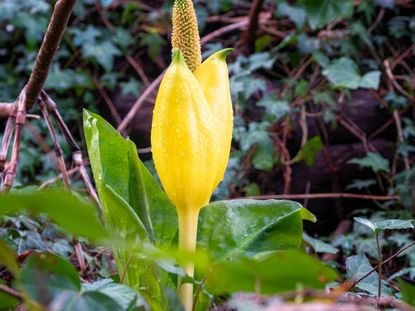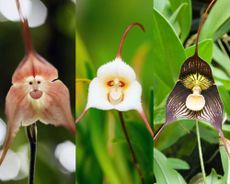Skunk Cabbage Facts: Growing Skunk Cabbages In Gardens

The skunk cabbage plant may be unusual, and stinky, but it is also quite interesting and uses for skunk cabbage in the garden could actually be beneficial. Keep reading for more skunk cabbage facts.
Skunk Cabbage Facts
So what is skunk cabbage? Skunk cabbage is a perennial wildflower that grows in swampy, wet areas of forest lands. This unusual plant sprouts very early in the spring, and has an odd chemistry that creates its own heat, often melting the snow around itself as it first sprouts in the spring. While the first sprout, a pod-like growth, looks like something out of a science-fiction movie, the skunk cabbage is a plain-looking green plant once the leaves appear. You may find two common types: Eastern skunk cabbage (Symplocarpus foetidus), which is purple, and Western skunk cabbage (Lysichiton americanus), which is yellow. Skunk cabbage gets its name from the fact that, when the leaves are crushed or bruised, it gives off a smell of skunk or rotting meat.
Growing Skunk Cabbages in Gardens
The uses for skunk cabbage in the home garden are all tied into that distinctive smell. While it repels humans, that smell is like perfume to bees, butterflies, and many other beneficial insects. If you're having a hard time attracting pollinators or beneficial wasps, mixing a few skunk cabbage plants in with the rest of your garden may be a good solution. Skunk cabbage also repels many mammals, so it can be useful if you have a problem with four-legged vegetable thieves. If squirrels are eating your corn or raccoons get into your tomatoes, the scent of skunk cabbage may be enough to keep them away, allowing you to harvest food without bite marks.
Is Skunk Cabbage Poisonous?
For the insects that love the scent and nectar from the skunk cabbage plant, it is a natural and healthy part of their diet. For human beings, dogs, cats, and other mammals, it's a totally different story. In small doses, or two small bites, the skunk cabbage plant can cause burning and swelling of the mouth and a choking sensation. Eating larger portions of these leaves can, in extreme cases, be fatal. If you have small children, inquisitive pets, or neighbors who may accidentally eat some leaves from your garden, growing skunk cabbage may not be a good idea. However, if the smell doesn't bother you and you want to attract the right kind of insects to your garden, adding this unusual wildflower might be just the right choice.
Gardening tips, videos, info and more delivered right to your inbox!
Sign up for the Gardening Know How newsletter today and receive a free download of our most popular eBook "How to Grow Delicious Tomatoes."
-
 How To Get Rid Of Mosquitoes In The Garden: 9 Natural Ways To Make Them Buzz Off!
How To Get Rid Of Mosquitoes In The Garden: 9 Natural Ways To Make Them Buzz Off!How to get rid of mosquitoes is on the minds of people in the summer in almost every region of the world. Learn how to repel the pests without toxic chemicals.
By Mary Ellen Ellis
-
 Monkey Orchid Care: How To Grow This Fascinating Species
Monkey Orchid Care: How To Grow This Fascinating SpeciesThe monkey orchid bears a remarkable resemblance to its namesake and, with a little know-how, can be successfully grown as a houseplant.
By Bonnie L. Grant